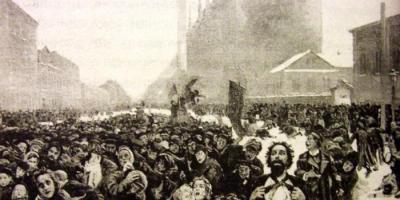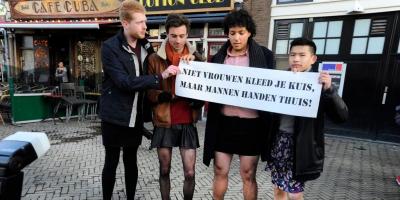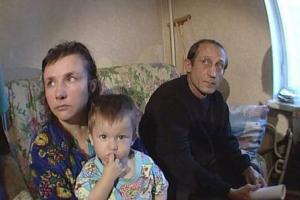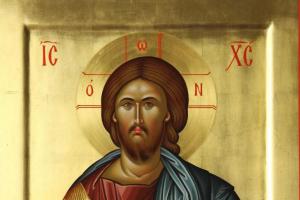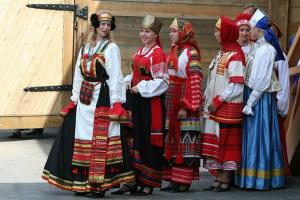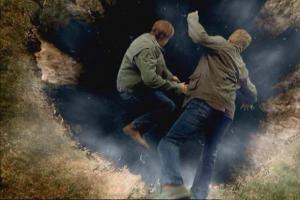June 28th, 2014 , 03:55 am
→ There are no Russians
Unfortunately, the ethnonym “Russian people” is absolutely artificial, fictitious, synthetic, and therefore has no right to exist, since it does not have its most important foundation - the people.
The ethnic group, tribe, people, nation “Russians” never existed.
Moreover, as Konstantin Yerusalimsky, Doctor of Historical Sciences, Professor of the Department of Sociocultural Studies of the Russian State University for the Humanities, a specialist in the history of Eastern Europe in the Middle Ages and modern times, the history of Cyrillic handwritten books and bookmaking, writes:
Until the end of the 16th century, the phrase “Russian people” does not appear in any source, and from the end of the 16th century, this phrase was used exclusively outside the Moscow Principality!
How did it happen that there are people - people who call themselves Russians - but there is no nation? What's the matter?
And it's all about religion.
Kyiv, thanks to reforms and not without the cunning of Yaroslav the Wise, became a metropolis - the new capital of the Christian world. It was thanks to him that the Christian church with its center in Kyiv began to be called Russian, and all the believers of this church became Russian!
In 1051, having gathered bishops, Yaroslav, without the consent of the Patriarch of Constantinople, himself appointed Hilarion Metropolitan, and when in 1054 the Christian Church broke up into the Orthodox Church with its center in Constantinople, and the Catholic Church with its center in Rome, Kyiv actually legally became a separate denomination - the Russian center in Kyiv. And all the people of Kyiv, Novgorod, Polotsk began to be called Russian - but not by people, but by religion
Moscow, being of the Orthodox confession, was rooted in the Assyrian Church of the East, one of the postulates of which was to oppose itself to the West - Rome. It was for this reason that Moscow withdrew from the Union of Florence of 1438, just as it left the bosom of the Christian Church, anathematizing all Uniates.
After the fall of Constantinople in 1453, John III, with the active assistance of the Moscow church, announced that after the fall of Constantinople, Moscow was the only one who could lay claim to his inheritance, and therefore named himself the heir to the Byzantine throne, and ordered Moscow to be called the Third Rome. In addition to the inheritance to the throne of Constantinople, he intended to lay claim to John III and the throne of Kiev, which, together with the Russian Church, he intended to absorb.
Precisely because Moscow became, in essence, an Orthodox Caliphate, there was no place for the national question in its doctrine; all attention was paid exclusively to religion. Therefore, in Moscow’s church-political culture it was impossible to think in ethnic categories.
And the people, the people of Moscow... Who are the people in the Principality of Moscow? All the people, without exception, belonged to the prince, that is, they were the prince’s slaves. And a slave, as you know, does not have a nation.
However, the ethnonym “Russian people” came into use in the Moscow principality, primarily from the Ukrainian cultural context of the Kiev-Mohyla Academy of the mid-17th century - still the center of the Russian faith.
As I already wrote above, the concept of “Russian people” is much broader than an ethnic group, because it included many different peoples: Ukrainians, Poles, Belarusians, Lithuanians. Balts and Slavs - all those who were of the same faith - Russian.
In Muscovy, questions of the nation were not raised until the reforms of Peter I, and therefore until the middle of the 17th century in the chronicles we can only find such pseudo-ethnic concepts as “Orthodox all people”, “Christian people” or “all Christian people”, “Moscow all people of Christianity” . That is, the Moscow rulers of that time were not interested in the origin of people, their nation, ethnic group. They were only interested in a person's religion.
At the same time, as you can see, political strategists of that time were already experimenting with names, trying to come up with a new exclusive name for the loyal subjects of Muscovy, not forgetting to emphasize their religion - Orthodox, true believer.
For the first time, you can find the concept of “Russian” in relation to the people in the writings of the Ukrainian educator Meletiy Smotrytsky.
And also from Prince Konstantin Konstantinovich Ostrozhsky, an employee of Kurbsky, who hired Moscow printer Ivan Fedorov. Prince Konstantin Ostrogsky uses the concept “Russian” correctly and describes the peoples of the Polish-Lithuanian Commonwealth, but not Moscow!
Never until the 20th century, in Muscovy, and then in Russia, the concept “Russian” was used as a name for the titular nation.
Moreover, in Muscovy the concept of “Russian” came only in the second half of the 17th century, and that was due to the fact that Ukrainian book learning began to penetrate into Moscow.
The Russians did not become Russian even under Peter I, so, for example, in a quote from the report of Field Marshal Boris Sheremetev, sent to Peter in the summer of 1703, you will find the words: ... “Russian men are unpleasant to us, many runaways from Novgorod, and from Valdai, and from there Pskov, and they are kinder to the Swedes than to us!
What does this mean? Yes, that it was the people of the Russian faith - the Russians - who resisted the Moscow occupiers!
By the end of the 17th century, the Kiev Russian Church was already completely absorbed, historical literary sources were destroyed, books were burned. Priests who refused to recognize the primacy of the Moscow Orthodox Church were executed.
Since a huge number of believers of the Russian faith remained, a new ideological formula was developed for them to explain the absorption of the Russian church: “Russian means Orthodox, Orthodox means Russian.” It seemed logical, correct and convenient and did not require additional explanation.
By the beginning of the 19th century, after all the lands inhabited by peoples of the Russian faith were captured, problems arose before Russia. At that time, the Russian Empire did not have any legal grounds to attack Europe!
It was then that it became clear to the ideologists of the Third Rome that the fundamental idea of the religious division of peoples had exhausted itself and it was necessary to create something new. It was necessary to find something unifying, something that could serve as a reason for a just war.
And this idea became the idea of Pan-Slavism, which essentially became a copy of the idea of Pan-Germanism that was emerging at the same time.
The concept of the idea of Pan-Slavism in Russia was developed in the late 1830s by Mikhail Pogodina, who put forward the following fundamental theses of the concept:
The true faith of the Slavic world - Moscow Orthodoxy
the dominant role of Russia among the Slavs
unification mission of Russia - Mother
Russia is the defender of the Orthodox faith, the defender of all Slavs.
At the same time, while the idea that Russians are “Russians,” the titular nation of the Slavic world, was being introduced into the minds of the Slavic peoples, the assertion was imposed on the population of the Empire that they were these same “Russians.”
It must be said that projects for the political unification of the Slavs under the heel (allegedly protection) of the Russian Empire were developed back in the 18th-19th centuries by Andrei Samborsky, Vasily Malinovsky, and they were promoted as projects for the liberation of the Slavs from Ottoman, Austrian German rule and the creation of a Slavic federation - within the framework of the Russian Empire .
Around the middle of the 19th century, realizing that the Russian Church had already been forgotten, the mythologeme “Holy Rus'” became a new object of propaganda, and from this the idea of “Russianness” began to be popularized.
In parallel, the issue of a just war of the Orthodox Caliphate for Constantinople occupied by the Gentiles began to be raised more and more often.
The term “Russian” took root quite well among the soldiers of the Empire during the years of numerous wars with Turkey, which lasted almost continuously throughout the end of the 19th century.
After the fall of the Empire, the term “Russian” was picked up by the Bolsheviks; it became one of the most important signs of a standard person, a person of the highest caste.
The ideal Bolshevik was a proletarian worker, a communist and necessarily “Russian”. Over time, “Russian” again became a common noun, and every resident of the USSR could consider himself “Russian.”
Just as in the idea of Pan-Slavism, Russia extended its hands to the peoples suffering under the yoke of the Ottomans, Austria and Germany, the “Russians” (Bolshevik proletarians) extended a helping hand to all the oppressed of the world, and offered to come to their aid, help overthrow their government and also how they could become part of the largest “Prison of Nations” in the history of mankind.
Material from Wikipedia - the free encyclopedia
| This article is proposed for deletion. An explanation of the reasons and the corresponding discussion can be found on the page Wikipedia: To be deleted/March 18, 2016. |
Fictional peoples of Russia- fictitious, officially not recognized “peoples” (fictitious self-names) of Russia.
- In the Saratov region, a citizen identified himself as a Polovtsian and demanded from Russia restitution in the form of the Polovtsian steppes or compensation for them in the form of a three-room apartment.
- In Rostov-on-Don there is a cultural and political society “Scythian National Congress”, whose members recognize themselves as Scythians and declare to recreate Great Scythia as a virtual state); the head of the society stated that “in the last 100 years this is the first census that allows the Scythians to be included.”
- In Tatarstan, census takers recorded Incas speaking the Mohican language.
- A well-known political figure, deputy of the State Duma of the Russian Federation V.V. Semago publicly claimed that he was a Pecheneg.
- In the FIDO ZX.SPECTRUM echo conference on September 5, 2002, all subscribers were asked to enter the nationality “Spectrumist” in their ballots.
- In Soviet times and several years later, before the introduction of passports of the Russian Federation, a joke was popular among residents of the Udmurt Republic when residents of other regions were shown a passport page indicating the nationality of its owner as confirmation of his belonging to a little-known people buzzing. Since passports issued in the autonomous republics were bilingual, there were two such pages - Russian and Udmurt. If the owner of the passport was Russian, his nationality on the Udmurt-language page was indicated in translation into the Udmurt language as “ӟuch”, which is what the joke was based on: the object of the joke did not pay attention to the fact that the text of the page, typed in small letters, was Udmurt-language, and I saw only the nationality “zuch” written in large letters by hand in Cyrillic (the Udmurt “ӟuch” is pronounced differently, but not only the object of the joke, but usually the jokers themselves did not know the correct pronunciation, since the Udmurt language in the Udmurt Autonomous Soviet Socialist Republic was almost unknown to non-Udmurts).
Fictional peoples in other countries
see also
Write a review about the article "Fictional peoples in Russia"
Notes
Links
- lenta.ru/articles/2003/11/03/census/
- news.bbc.co.uk/hi/russian/press/newsid_2334000/2334545.stm
- riw.ru/russia4165.html
- www.newsru.com/russia/15oct2002/polovets.html
- demoscope.ru/weekly/2002/083/perepis03.php
- demoscope.ru/weekly/2002/085/perepis07.php
An excerpt characterizing fictional peoples in Russia
- Well, drink it all! - said Anatole, handing the last glass to Pierre, - otherwise I won’t let you in!“No, I don’t want to,” Pierre said, pushing Anatole away and went to the window.
Dolokhov held the Englishman’s hand and clearly, distinctly spelled out the terms of the bet, addressing mainly Anatole and Pierre.
Dolokhov was a man of average height, with curly hair and light blue eyes. He was about twenty-five years old. He did not wear a mustache, like all infantry officers, and his mouth, the most striking feature of his face, was completely visible. The lines of this mouth were remarkably finely curved. In the middle, the upper lip energetically dropped onto the strong lower lip like a sharp wedge, and something like two smiles constantly formed in the corners, one on each side; and all together, and especially in combination with a firm, insolent, intelligent gaze, it created such an impression that it was impossible not to notice this face. Dolokhov was a poor man, without any connections. And despite the fact that Anatole lived in tens of thousands, Dolokhov lived with him and managed to position himself in such a way that Anatole and everyone who knew them respected Dolokhov more than Anatole. Dolokhov played all the games and almost always won. No matter how much he drank, he never lost his clarity of mind. Both Kuragin and Dolokhov at that time were celebrities in the world of rakes and revelers in St. Petersburg.
A bottle of rum was brought; the frame that did not allow anyone to sit on the outer slope of the window was broken out by two footmen, apparently in a hurry and timid from the advice and shouts of the surrounding gentlemen.
Anatole walked up to the window with his victorious look. He wanted to break something. He pushed the lackeys away and pulled the frame, but the frame did not give up. He broke the glass.
“Well, how are you, strong man,” he turned to Pierre.
Pierre took hold of the crossbars, pulled, and with a crash the oak frame turned out.
“Get out, otherwise they’ll think I’m holding on,” said Dolokhov.
“The Englishman is bragging... huh?... good?...” said Anatole.
“Okay,” said Pierre, looking at Dolokhov, who, taking a bottle of rum in his hands, was approaching the window from which the light of the sky and the morning and evening dawns merging on it could be seen.
Dolokhov, with a bottle of rum in his hand, jumped up onto the window. "Listen!"
he shouted, standing on the windowsill and turning into the room. Everyone fell silent.
- I bet (he spoke French so that an Englishman could understand him, and did not speak this language very well). I bet you fifty imperials, would you like a hundred? - he added, turning to the Englishman.
“No, fifty,” said the Englishman.
- Okay, for fifty imperials - that I will drink the entire bottle of rum without taking it from my mouth, I will drink it while sitting outside the window, right here (he bent down and showed the sloping ledge of the wall outside the window) and without holding on to anything... So? ...
“Very good,” said the Englishman.
Anatole turned to the Englishman and, taking him by the button of his tailcoat and looking down at him (the Englishman was short), began repeating to him the terms of the bet in English.
- Wait! - Dolokhov shouted, banging the bottle on the window to attract attention. - Wait, Kuragin; listen. If anyone does the same, then I pay one hundred imperials. Do you understand?
The Englishman nodded his head, not giving any indication as to whether he intended to accept this new bet or not. Anatole did not let go of the Englishman and, despite the fact that he nodded, letting him know that he understood everything, Anatole translated Dolokhov’s words to him in English. A young thin boy, a life hussar, who had lost that evening, climbed onto the window, leaned out and looked down.
“Uh!... uh!... uh!...” he said, looking out the window at the stone sidewalk.
- Attention! - Dolokhov shouted and pulled the officer from the window, who, entangled in his spurs, awkwardly jumped into the room.
Having placed the bottle on the windowsill so that it would be convenient to get it, Dolokhov carefully and quietly climbed out the window. Dropping his legs and leaning both hands on the edges of the window, he measured himself, sat down, lowered his hands, moved to the right, to the left and took out a bottle. Anatole brought two candles and put them on the windowsill, although it was already quite light. Dolokhov's back in a white shirt and his curly head were illuminated from both sides. Everyone crowded around the window. The Englishman stood in front. Pierre smiled and said nothing. One of those present, older than the others, with a frightened and angry face, suddenly moved forward and wanted to grab Dolokhov by the shirt.
- Gentlemen, this is nonsense; he will be killed to death,” said this more prudent man.
Anatole stopped him:
“Don’t touch it, you’ll scare him and he’ll kill himself.” Eh?... What then?... Eh?...
Dolokhov turned around, straightening himself and again spreading his arms.
“If anyone else bothers me,” he said, rarely letting words slip through his clenched and thin lips, “I’ll bring him down here now.” Well!…
Having said “well”!, he turned again, let go of his hands, took the bottle and brought it to his mouth, threw his head back and threw his free hand up for leverage. One of the footmen, who began to pick up the glass, stopped in a bent position, not taking his eyes off the window and Dolokhov’s back. Anatole stood straight, eyes open. The Englishman, his lips thrust forward, looked from the side. The one who stopped him ran to the corner of the room and lay down on the sofa facing the wall. Pierre covered his face, and a weak smile, forgotten, remained on his face, although it now expressed horror and fear. Everyone was silent. Pierre took his hands away from his eyes: Dolokhov was still sitting in the same position, only his head was bent back, so that the curly hair of the back of his head touched the collar of his shirt, and the hand with the bottle rose higher and higher, shuddering and making an effort. The bottle was apparently emptied and at the same time rose, bending its head. “What’s taking so long?” thought Pierre. It seemed to him that more than half an hour had passed. Suddenly Dolokhov made a backward movement with his back, and his hand trembled nervously; this shudder was enough to move the entire body sitting on the sloping slope. He shifted all over, and his hand and head trembled even more, making an effort. One hand rose to grab the window sill, but dropped again. Pierre closed his eyes again and told himself that he would never open them. Suddenly he felt that everything around him was moving. He looked: Dolokhov was standing on the windowsill, his face was pale and cheerful.
- Empty!
He threw the bottle to the Englishman, who deftly caught it. Dolokhov jumped from the window. He smelled strongly of rum.
- Great! Well done! So bet! Damn you completely! - they shouted from different sides.
The Englishman took out his wallet and counted out the money. Dolokhov frowned and was silent. Pierre jumped onto the window.
Gentlemen! Who wants to bet with me? “I’ll do the same,” he suddenly shouted. “And there’s no need for a bet, that’s what.” They told me to give him a bottle. I'll do it... tell me to give it.
- Let it go, let it go! – said Dolokhov, smiling.
- What you? crazy? Who will let you in? “Your head is spinning even on the stairs,” they spoke from different sides.
Despite all the attempts of historians and ethnographers to create a clear picture of the development of some peoples, there are still many secrets and blank spots in the history of the origin of many nations and nationalities. Our review contains the most mysterious peoples of our planet - some of them have sunk into oblivion, while others live and develop today.
1. Russians

As everyone knows, Russians are the most mysterious people on Earth. Moreover, there is a scientific basis for this. Scientists still cannot come to a consensus about the origin of this people and answer the question of when Russians became Russians. There is also debate about where this word comes from. Russian ancestors are sought among the Normans, Scythians, Sarmatians, Vends and even the South Siberian Usuns.
2. Maya

Nobody knows where these people came from or where they disappeared to. Some scientists believe that the Mayans are related to the legendary Atlanteans, others suggest that their ancestors were the Egyptians.
The Mayans created an efficient agricultural system and had deep knowledge of astronomy. Their calendar was used by other peoples of Central America. The Mayans used a hieroglyphic writing system that has only been partially deciphered. Their civilization was very advanced when the conquistadors arrived. Now it seems that the Mayans came from nowhere and disappeared into nowhere.
3. Laplanders or Sami

The people, which Russians also call Lapps, are at least 5,000 years old. Scientists are still arguing about their origin. Some believe that the Laplanders are Mongoloids, others insist on the version that the Sami are Paleo-Europeans. Their language is believed to belong to the Finno-Ugric group of languages, but there are ten dialects of the Sami language that are different enough to be called independent. Sometimes the Laplanders themselves have difficulty understanding each other.
4. Prussians

The very origin of the Prussians is a mystery. They were first mentioned in the 9th century in the records of an anonymous trader, and then in Polish and German chronicles. Linguists have found analogues in various Indo-European languages and believe that the word “Prussians” can be traced back to the Sanskrit word “purusha” (man). Not much is known about the Prussian language, since the last native speaker died in 1677. The history of Prussianism and the Kingdom of Prussia began in the 17th century, but these people had little in common with the original Baltic Prussians.
5. Cossacks

Scientists do not know where the Cossacks originally came from. Their homeland may be in the North Caucasus or on the Sea of Azov or in western Turkestan... Their ancestry may go back to the Scythians, Alans, Circassians, Khazars or Goths. Each version has its supporters and its own arguments. Cossacks today represent a multi-ethnic community, but they constantly emphasize that they are a separate nation.
6. Parsis

Parsis are an ethno-religious group of followers of Zoroastrianism of Iranian origin in South Asia. Today their number is less than 130 thousand people. The Parsis have their own temples and so-called “towers of silence” for burying the dead (the corpses that are laid out on the roofs of these towers are pecked by vultures). They are often compared to the Jews, who were also forced to leave their homeland, and who still carefully preserve the traditions of their cults.
7. Hutsuls
The question of what the word “Hutsul” means is still unclear. Some scientists believe that the etymology of the word is related to the Moldovan “gots” or “gutz” (“bandit”), others believe that the name comes from the word “kochul” (“shepherd”). Hutsuls are most often called Ukrainian highlanders, who still practice the traditions of molfarism (witchcraft) and who greatly honor their sorcerers.
8. Hittites

The Hittite state was very influential on the geopolitical map of the ancient world. These people were the first to create a constitution and use chariots. However, not much is known about them. The chronology of the Hittites is known only from the sources of their neighbors, but there is not a single mention of why or where they disappeared. The German scientist Johann Lehmann wrote in his book that the Hittites went north and assimilated with the Germanic tribes. But this is only one of the versions.
9. Sumerians

This is one of the most mysterious peoples in the ancient world. Nothing is known about their origins or the origin of their language. The large number of homonyms suggests that it was a polytonic language (like modern Chinese), that is, the meaning of what was said often depended on tone. The Sumerians were very advanced - they were the first in the Middle East to use the wheel, to create an irrigation system and a unique writing system. The Sumerians also developed mathematics and astronomy at an impressive level.
10. Etruscans

They entered history quite unexpectedly and that is how they disappeared. Archaeologists believe that the Etruscans lived in the north-west of the Apennine Peninsula, where they created a fairly developed civilization. The Etruscans founded the first Italian cities. Theoretically, they could move to the east and become the founders of the Slavic ethnic group (their language has much in common with the Slavic ones).
11. Armenians

The origin of the Armenians is also a mystery. There are many versions. Some scientists believe that the Armenians descended from the people of the ancient state of Urartu, but in the genetic code of the Armenians there is a component not only of the Urartians, but also of the Hurrians and Libyans, not to mention the proto-Armenians. There are also Greek versions of their origin. Most scientists, however, adhere to the mixed-migration hypothesis of Armenian ethnogenesis.
12. Gypsies

According to linguistic and genetic studies, the ancestors of the Roma left Indian territory in numbers that did not exceed 1,000 people. Today there are about 10 million Roma people worldwide. In the Middle Ages, Europeans believed that Gypsies were Egyptians. They were called the "tribe of the pharaoh" for a very specific reason: the Europeans were amazed by the gypsy tradition of embalming their dead and burying with them in crypts everything that might be needed in another life. This gypsy tradition is still alive.
13. Jews

This is one of the most mysterious peoples and many secrets are connected with Jews. At the end of the 8th century BC. five-sixths (10 out of 12 of all ethnic groups that form the race) of Jews disappeared. Where they went is a mystery to this day.
Connoisseurs of female beauty will definitely like it.
14. Guanches

The Guanches are the original inhabitants of the Canary Islands. It is unknown how they appeared on the island of Tenerife - they did not have ships and the Guanches knew nothing about navigation. Their anthropological type does not correspond to the latitude where they lived. Also, many disputes are caused by the presence of rectangular pyramids in Tenerife - they are similar to the Mayan and Aztec pyramids in Mexico. Nobody knows when or why they were erected.
15. Khazars

Everything that people know about the Khazars today was taken from the records of their neighboring peoples. And practically nothing remained of the Khazars themselves. Their appearance was sudden and unexpected, just like their disappearance.
16. Basque

The age, origin and language of the Basques are a mystery in modern history. The Basque language, Euskara, is believed to be the only remnant of a Proto-Indo-European language that does not belong to any language group existing today. According to a 2012 National Geographic study, all Basques have a set of genes that is largely different from other peoples living around them.
17. Chaldeans

The Chaldeans lived at the end of the 2nd - beginning of the 1st thousand years BC in the territory of Southern and Central Mesopotamia. In 626-538 BC. The Chaldean dynasty ruled Babylon, founding the Neo-Babylonian Empire. The Chaldeans are still associated today with magic and astrology. In Ancient Greece and Rome, priests and Babylonian astrologers were called Chaldeans. They predicted the future of Alexander the Great and his successors.
18. Sarmatians

Herodotus once called the Sarmatians “lizards with human heads.” M. Lomonosov believed that they were the ancestors of the Slavs, and the Polish nobles considered themselves their direct descendants. The Sarmatians left behind many secrets. For example, this people had a tradition of artificial deformation of the skull, which allowed people to give themselves an ovoid head shape.
19. Kalash

A small people living in the north of Pakistan, in the Hindu Kush mountains, is notable for the fact that their skin color is whiter than that of other Asian peoples. The debate about Kalash has been subsiding for centuries. The people themselves insist on their connection with Alexander the Great. Their language is phonologically atypical for the area and has the basic structure of Sanskrit. Despite attempts at Islamization, many adhere to polytheism.
20. Philistines

The modern concept of "Philistines" comes from the name of the area "Philistia". The Philistines are the most mysterious people mentioned in the Bible. Only they and the Hittites knew the technology of steel production and it was they who laid the foundation for the Iron Age. According to the Bible, the Philistines came from the island of Caphtor (Crete). The Cretan origin of the Philistines is confirmed by Egyptian manuscripts and archaeological finds. It is unknown where they disappeared to, but it is most likely that the Philistines were assimilated into the Eastern Mediterranean peoples.
In order to prove that the Russians are a second-class nation, I will need a roll of garbage bags. Like this:
As you can see, it does not tear through the holes. A year ago they were better - they had a blast.
Let's figure it out. The film is cut through two interlocking parts. The principle of perforation is used very widely. Tin can key, roll-up cap, pop-off lids and stoppers, etc. In any case, there will be two parts that cut the material:

These two edge parts have the highest hardness and precision. They must pick up millions of pieces of products. And they will be dumb. The hardened edge is called a "press edge". It is difficult to make, you have to heat it with HDTV, and for this you need to make a fantastic inductor that follows the contour, nitriding, etc... The most complex cuttings are produced by Germany, Switzerland and Japan.
If the edging is long and folded, the price of the molds is therefore five times higher than the price of the installation itself. The packaging may be more expensive than the contents.
And it will still get dull. We'll have to change it. But if we change the shape not after 2 million products, but after 6, we will reduce the price of the product by half or three times.
Got it? The lid does not fold, the tongue does not come off - they are making money on you. The 6th million has arrived.
Our Duma does not know about the press cant. When he finds out, he will pass a law on “ultimate blunting.” Without the law, the Russians will make 6.8 million. Without blinking an eye. When will he accept? When some dad can’t open a bottle of “mole”, he will cut off the child protection, like all Russian dads. A two year old will open it and drink. He was burned through, dad hanged himself, mom was in a madhouse. Then they will accept it.
But in the West there is no law. And the bag tears through the holes. The lid comes off. Two million - changed forms.
You don’t understand why we have such frequent disasters? If you don't tell the Russians, they will go out into the Volga with their portholes open, drawing water. If a cow falls into a tank of potassium cyanide, it will be made into sausage. If the permissible content of potassium cyanide is not specified in the standards, they will do it.
Let's imagine two organisms. One is ordinary. The other one is like he has everything “over his head.” He must remember to inhale and exhale. Push blood through the veins. He must remember how to move his feet.
These are Russians.
This organism is second-rate. Doomed.
As I board the tram, I hear “To avoid possible injury, please hold on to the handrails.” Thank you, but I thought the handrails were for drying clothes. There should be a sign in front of the stairs that reads: “Remember to alternately lift your legs onto the steps.” Not ordered? Let's come up and don't lift our leg. Bam - nose. Let it be worse for them.
Why are bureaucrats swelling? Is there half the country in Moscow? There are no nerve fibers, the “body” that is controlled is mysterious. Whether Russia exists at all is unclear inside the Ring. Her head was fantastically swollen - she could do everything just by imagining what was there and how to walk with it.
Here, "Krymnash". Well, he gave me thousands of marked rubles. It is allowed for vodka, for sausage, for democracy - or for Crimea. How many rubles will be in Crimea in 2013? Say?
This is 100% miasm of the Kremlin. One man. Not a single dog remembered “whose Crimea” it was.
The horror is that all Russians are like this. Every single one. When Navalny says “I won’t give it up,” I’m shocked. “I’ll give it up”, not “I’ll give it up”? Shut up, Lyosha! Don't replace the people with yourself. The people want to die of hunger, but provide for Crimea. The people want dachas and Cyprus means without Crimea. Yurochka, Shender, when you say “democracy must be fostered among the people,” I would like to ask “how”? Should I put it in a corner or with a belt? This people is a thousand years old. He doesn't need democracy, so go through the woods. You, Yur, are the people who need to be educated so that you don’t give priceless instructions to the people.
Nobody asked what he needed. I don't have the slightest idea. What I want myself, the authorities have no idea and did not intend to. We just have to shout our thoughts into our ears. Everyone is yelling. Dugin screams his paranoia into Putin’s ear. Girkin - his. Paranoids are the most powerful weapon. Girkin came running, thinking he was starting a holy war. But this is his personal miasma, internal to the head - who needs a war in 2014? Contact with reality is a break in the pattern. And Dugin is from Saturn.
Who did Putin's angry speeches fall on? To the most harmless US President of the 44! The miasma in the Kremlin gives rise to a miasma in which the picture of the world has nothing in common with reality, and even Obama grows fur and teeth! Listening to what he said, is saying and will say is as pointless as listening to the babble of a cocaine addict. The Kremlin’s organs that perceive reality have atrophied. As unnecessary. He lives in his fantasies.
I affirmed, I affirm, and I will affirm that not a single Russian, including me , does not know how to manage. In management, the main thing is not the genius of the leader, but the quality of feedback. You can sell a hundred brilliant designers just to know exactly what consumers want.
No feedback? This is your ancient second-rate nation. Why it hasn’t become extinct yet, the devil only knows.
This post is not about democracy. An ancient pharaoh can look for what the people need, and a democratic chancellor will instill in him deadly Nietzscheanism..
“Change Putin...” They will announce on the box who is next - and everyone, spraying saliva, will rush to discuss. What luck we had. Or misfortune.
You know, this doesn't suit me.
When he shoots himself and the Duma collectively takes poison, it will mean that the Russians are reinstalling the system. They change their 286th Windows, which is no longer used anywhere. That they are tired of being a second-class nation. And to die out - the only one on the planet.
At the time of population censuses in Russia, propaganda addressed to Russians is actively disseminated: so that, depending on the territory of residence, they should be recorded on the census forms with the name of a regional subethnic group, a social group, or a generally fictitious people. With the abolition of mentioning nationality in passports, as well as allowing citizens to voluntarily choose their ethnicity, an epic bacchanalia began on the national question. Many experts argue that this is due to significant blunders in the country’s domestic policy. The imposition from above of citizenship in Russia as a single nationality for all (Russian), which is common in some Western countries, has not been successful in our community. But due to the crisis of Russian identification in the 1990s and 2000s, numerous anti-Russian regional projects emerged. Let's try to figure out how they threaten the unity of the Russian state.
Cossacks
Traditionally, a few months before the census, a man in uniform appears on central all-Russian television channels, radio and other media and declares: “We are not Russians by nationality, but Cossacks.” Moreover, the majority of the population on the Don has a negative attitude towards the modern Cossacks and with great suspicion. The fact is that after the Civil War and de-Cossackization there were very few pure Cossack families left. The descendants of the foreigners who came and settled in their place today prove their alleged Cossack origins and the right of their “nation” to self-determination, even to the point of separation from Russia. This artificiality is what the locals notice, calling them mummers, which greatly irritates modern Cossacks. There is a certain hostility between the so-called registered Cossacks, serving in the state register, who do not have any pseudo-national plans, and the “public” ones. And if some (especially those who defend Donbass) are patriots of Russia and consider the Cossacks to be a special type of Russian army, then others are separatists who are considering plans to create their own republics and gain independence. Atamans of state military Cossack societies also openly demanded to register as Cossacks by nationality - apparently, to further attract funding to their structures.
Recently, numerous amateur historical concepts and pseudoscientific interpretations of history have begun to be created, designed to prove the non-Russian origin of the inhabitants of the Don, to show their proximity to the Caucasus, Turkic peoples, Kalmyks, etc. In their propaganda, the Cossacks (as this group began to be called) even use quotes from the novel “Quiet Don” by Mikhail Sholokhov, who, by the way, was born into a family from the Ryazan province and was not a member of the Cossack class.
A new “language” is being created, which no one in the modern Rostov and Volgograd regions has ever spoken, new letters in the alphabet. Everything is according to the already verified scenario. People whose families were truly Don Cossacks (the author of these lines is among them), for the most part watch such insinuations with horror. No one denies that the Cossacks were once a special ethnosocial group of the Russian Empire, and indeed the national question on the Don was raised during the fight against the Bolsheviks, but they never had any distinctive signs of identification from other Russians. The Cossack class by that time was an archaism, with a special way of life that is impossible to recreate today. The Bolsheviks destroyed the Cossack way of life, and most of the Cossacks themselves. Now the atamans hope that recognition of the Cossacks as a separate nationality at the official level will force the authorities to implement the law on the rehabilitation of repressed peoples - that is, return lost property to the Cossacks and, most importantly, pay compensation.
In Kuban, everything is supported by some Ukrainian influence. In the villages south of Rostov and north of Krasnodar, their folk Little Russian dialect was once popular, but today it is practically not used by people under 60 years of age. But now, the more a young man feels like a Cossack, the more actively he uses it in oral speech. In addition, in connection with the events in Novorossiya, there is active propaganda from Ukraine that Kuban is supposedly the “original Ukrainian territory”, and the Kuban people are actually Ukrainians. Locals perceive this as a bad joke, even an insult.
It should be noted that if in 2002 140 thousand people signed up to be Cossacks by nationality throughout Russia, then in 2010 - only 67 thousand. This suggests that Russian self-awareness in the region has emerged from a deep crisis; many hereditary Cossacks realized that by enrolling as a subethnic group, they further divide the Russian people and act into the hands of Russia’s opponents, who often actually do not have any Cossacks at all roots. In other territories of historical settlement of the Cossacks, this issue is practically not raised.
"Siberianism"
The main idea of propaganda among the Siberian independentists was rhetoric that was tempting at first glance: if the so-called. “Siberianism”, it will be possible to create an independent republic and use the wealth of Siberia for the benefit of the inhabitants of the region themselves. According to tradition, work began on creating a “Siberian language”. The joy over the emergence of a new fictitious nationality was expectedly shared in the official federal media. For example, the Rossiyskaya Gazeta published an article “A Person of Siberian Nationality” with a positive assessment of such processes. But the regionalists found absolutely no support from the local population. The apologists of this idea expected that up to 20 million people would register as Siberians, but they received only four thousand, and then these were mainly people with Turkic surnames or of mixed origin. Which showed the strength of the Russian ethnic identity of Siberia. Russians understand that Siberians are a group of people of a non-ethnic nature, connected by similar ways and living conditions.
Pomors
During the 2002 census, the then governor (!) of the Arkhangelsk region, Anatoly Efremov, furiously called for registration as a Pomor by nationality. This was also explained by economic benefits for the region. Official recognition of the Pomors as a small indigenous northern people supposedly could give impetus to business development. For example, the Arkhangelsk region was counting on free quotas for coastal fishing and so on. In addition, small nations have the right to special payments for the use of natural resources of their territory. Neighboring countries—Norway and Finland—also became actively interested in this movement. Thus, with the support of the Norwegian side, “Pomeranian Tales” were published in the “Pomeranian language” (“Pomeranian dialect”), as well as a “dictionary”. In the local newspaper “Sovetskoye Belomorye” in 2010, in the article “We are Pomors”, they openly called for registration as Pomors by nationality at the time of the census. But the population of the region also did not support this project. If in 2002 there were about six thousand people who declared themselves Pomors, then in 2010 there were more than half as many.
Pomors, however, really exist - only this is not a nationality, but the Russian inhabitants of the White Sea region (hence the Slavic toponym Pomorie: Pomorie is, for example, in Poland). Russian Pomors were engaged in maritime trades, fishing and trade. They made a decisive contribution to the development of the Russian Arctic and are also known as the pioneers of Siberia.
Ingrians, orcs and all, all, all
Perhaps the most absurd of all possible concepts invented to divide Russians is the so-called movement. "Ingrians" in St. Petersburg and the Leningrad region. These people, being neither Finns, nor Izhorians, nor Vepsians, but ordinary Russians by origin, decided to just start considering themselves this special ethnonym. Of course, they do not have any connections with the indigenous population (until the 18th century) of these places. This group calls on all St. Petersburg residents who consider themselves Europeans to voluntarily abandon their Russian identification and take the path to Europe, hinting at a future separation from Russia. Particularly interesting is the linguistic problem of this small movement. The fact is that the historical languages of the indigenous population of the region belong to the Finno-Ugric group, and only the most ardent enthusiasts of the “free Ingria” think of learning them. The region does not have its own special dialect of the Russian language, so the “Ingrians” focus on the political and economic benefits of their theory.
There are similar anti-Russian projects in almost all regions and regions of the country. For Central Russia this is the movement of “zalestsy”, for residents of the Far East - “Far Easterners”, for the North - “northerners”, for the Pskov region - “skobars”, there are “Prussians” - in Kaliningrad and so on. Propaganda work has been launched for each of them: activists, who are actively supported by the media, are trying to convince the residents of Russia that in the “nationality” column it is more profitable to write anything but the word “Russian”. Such people exist, and they are the ones who are written down, among other things, as “orcs”, “elves”, “hobbits”, “Scythians” and other crazy names. In addition, Rosstat in the “Alphabetical List of Nationalities”, approved in 2010, lists such nationalities as “Soviet”, “Russian”; there is even a “Russian language”.
Heading for separation
The official authorities, sincerely confident that the unity of the state is ensured by multinationality, wanted different regional identities to form an all-Russian identity. Moreover, the main reason for the appearance among the Russian people of people who do not want to consider themselves Russian is the crisis of national self-identification and the lack of a correct national policy within the country. Unfortunately, it is still aimed more at the emergence of new nationalities, rather than at unification and assimilation into a single ethnocultural Russian community, which could lead to serious consequences for the state in the future. The development of such processes is actively monitored abroad.
Weakening the Russian people by creating another anti-Russian project, following the example of the Ukrainian or Belarusian movement, is very tempting for Russia’s opponents. Due to everyday rhetoric about multinationality to the detriment of the general population, the lack of a clear and often declared Russian identification among the country's top leadership, some citizens undergo a metamorphosis of self-awareness: a Russian, for example, begins to find non-Russian roots in his family, clinging with all his might to what some semi-mythical Tatar great-grandmother.
Propaganda aimed at destroying the Great Russian consciousness manifests itself mainly during the preparation and conduct of the census: this means that it is necessary to thoroughly prepare for it in advance. It seems that this provocation is being deliberately inflated by the official bodies responsible for population registration, otherwise there would be so many positive references to the topic of “new nationalities” and the division of old nationalities in the national and regional media?
Unfortunately, in the modern Russian Federation, ethnicity is not something that is passed down from generation to generation, it can be invented or chosen. This approach has begun to be used by the enemies of the Great Russian community, who are trying, under various pretexts, to create new anti-Russian identities in different regions of the country. And although official census figures show that from 2002 to 2010 there is a process of weakening of this trend, the enemies of Russia do not abandon their plans to divide the Russian people from within and further reduce their numbers.

